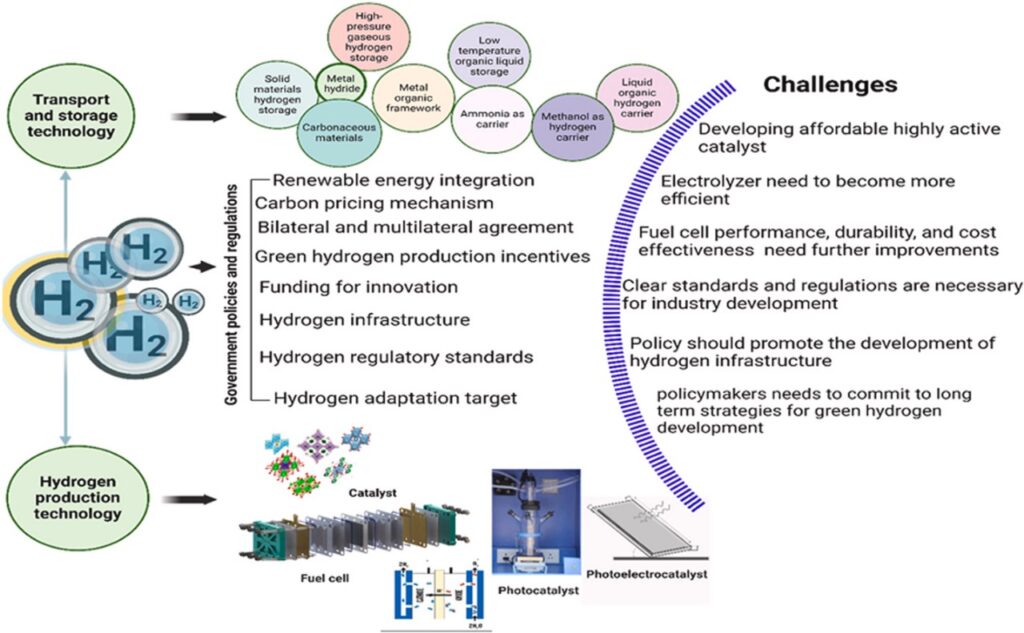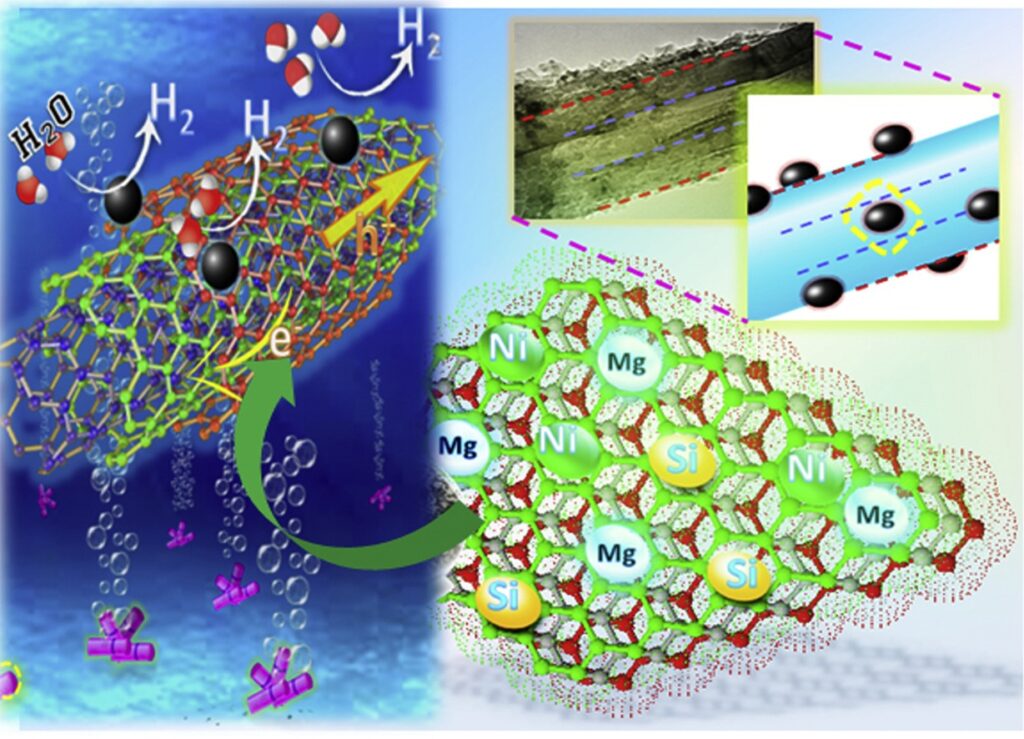Water Splitting research at Hydrogen Generation and CO2 Conversion Lab, Jashore University of Science and Technology, Bangladesh
Green hydrogen production through photocatalytic water splitting is pivotal for the next-generation fuel due to its potential to provide a clean, sustainable, and virtually limitless energy source. Efficient photocatalysts are crucial in this process as they directly influence the conversion efficiency of solar energy into hydrogen. High-performance photocatalysts enable effective absorption of sunlight, rapid electron transfer, and robust stability, which are essential for maximizing hydrogen yield and minimizing energy losses.
By harnessing solar energy, photocatalytic water splitting reduces reliance on fossil fuels, thereby mitigating greenhouse gas emissions and addressing climate change. Furthermore, the advancement of this technology supports the 4th and 5th industrial revolutions by fostering innovations in renewable energy, smart grid integration, and sustainable industrial processes. As industries move towards digitization and automation, green hydrogen can power advanced manufacturing and transportation systems, ensuring a resilient and eco-friendly energy infrastructure for the future.
Green hydrogen production through photocatalytic water splitting is pivotal for the next-generation fuel due to its potential to provide a clean, sustainable, and virtually limitless energy source. Efficient photocatalysts are crucial in this process as they directly influence the conversion efficiency of solar energy into hydrogen. High-performance photocatalysts enable effective absorption of sunlight, rapid electron transfer, and robust stability, which are essential for maximizing hydrogen yield and minimizing energy losses.
By harnessing solar energy, photocatalytic water splitting reduces reliance on fossil fuels, thereby mitigating greenhouse gas emissions and addressing climate change. Furthermore, the advancement of this technology supports the 4th and 5th industrial revolutions by fostering innovations in renewable energy, smart grid integration, and sustainable industrial processes. As industries move towards digitization and automation, green hydrogen can power advanced manufacturing and transportation systems, ensuring a resilient and eco-friendly energy infrastructure for the future.
Hydrogen Policy Research at Hydrogen Generation and CO2 Conversion Lab, Jashore University of Science and Technology, Bangladesh

Hydrogen energy policy research is crucial for guiding the strategic development and implementation of hydrogen as a clean energy carrier. This research informs policymakers on the most effective regulatory frameworks, financial incentives, and infrastructure investments needed to facilitate the hydrogen economy. It helps identify and address technical, economic, and social barriers to the adoption of hydrogen technologies. Scientifically, policy research evaluates the environmental impacts and lifecycle emissions of hydrogen production methods, ensuring sustainable practices are prioritized. It also examines the integration of hydrogen with existing energy systems, such as electricity grids and transportation networks, promoting seamless transitions to renewable energy sources. Additionally, hydrogen policy research supports innovation by highlighting areas requiring further scientific and technological advancements, thus driving research and development. By providing a comprehensive understanding of the multifaceted implications of hydrogen energy, policy research is essential for fostering a sustainable, secure, and economically viable energy future.
Hydrogen fuel cell research at Hydrogen Generation and CO2 Conversion Lab, Jashore University of Science and Technology, Bangladesh
Hydrogen fuel cell research is vital for advancing next-generation energy solutions due to its potential to provide clean, efficient, and sustainable power across various sectors. Fuel cells convert hydrogen into electricity with high efficiency and produce only water as a byproduct, significantly reducing greenhouse gas emissions and air pollutants. Research in this field focuses on improving the performance, durability, and cost-effectiveness of fuel cells, addressing key challenges such as catalyst optimization, membrane stability, and system integration. Advancements in fuel cell technology can enhance energy density and operational efficiency, making it viable for applications in transportation, stationary power generation, and portable devices. Moreover, hydrogen fuel cells facilitate the integration of renewable energy sources by providing a means for energy storage and load balancing in the grid. This research is essential for enabling a transition to a low-carbon economy, supporting sustainable development, and driving the innovations needed for the future energy landscape.

Development of low cost photocatalyst for water splitting at Hydrogen Generation and CO2 Conversion Lab, Jashore University of Science and Technology, Bangladesh

The development of cost-effective and efficient photocatalysts is essential for sustainable hydrogen production from water, as it addresses both economic and environmental challenges. Efficient photocatalysts enhance the rate of water splitting reactions by maximizing light absorption, facilitating charge separation, and accelerating redox reactions. This efficiency directly translates to higher hydrogen yields with lower energy inputs, making the process economically viable. Cost-effective materials, such as earth-abundant metals and non-toxic compounds, reduce the overall expense, enabling widespread adoption and scalability of the technology. Furthermore, the use of sustainable photocatalysts minimizes the environmental impact associated with their synthesis and disposal. As hydrogen is a clean energy carrier with only water as a byproduct, its sustainable production aligns with global efforts to reduce carbon emissions and dependence on fossil fuels. Advancing photocatalyst technology is thus pivotal in realizing a green hydrogen economy, integral to the transition towards renewable energy systems and sustainable industrial practices.
CO2 into renewable fuel research at Hydrogen Generation and CO2 Conversion Lab, Jashore University of Science and Technology, Bangladesh

The development of cost-effective and efficient photocatalysts is essential for sustainable hydrogen production from water, as it addresses both economic and environmental challenges. Efficient photocatalysts enhance the rate of water splitting reactions by maximizing light absorption, facilitating charge separation, and accelerating redox reactions. This efficiency directly translates to higher hydrogen yields with lower energy inputs, making the process economically viable. Cost-effective materials, such as earth-abundant metals and non-toxic compounds, reduce the overall expense, enabling widespread adoption and scalability of the technology. Furthermore, the use of sustainable photocatalysts minimizes the environmental impact associated with their synthesis and disposal. As hydrogen is a clean energy carrier with only water as a byproduct, its sustainable production aligns with global efforts to reduce carbon emissions and dependence on fossil fuels. Advancing photocatalyst technology is thus pivotal in realizing a green hydrogen economy, integral to the transition towards renewable energy systems and sustainable industrial practices.
